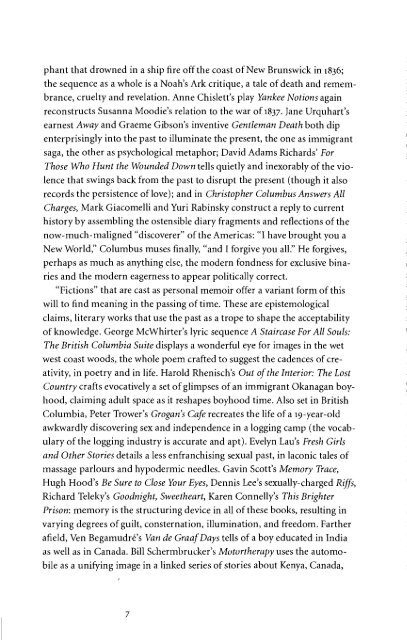The Carpathians - University of British Columbia
The Carpathians - University of British Columbia
The Carpathians - University of British Columbia
You also want an ePaper? Increase the reach of your titles
YUMPU automatically turns print PDFs into web optimized ePapers that Google loves.
phant that drowned in a ship fire <strong>of</strong>f the coast <strong>of</strong> New Brunswick in 1836;<br />
the sequence as a whole is a Noah's Ark critique, a tale <strong>of</strong> death and remembrance,<br />
cruelty and revelation. Anne Chislett's play Yankee Notions again<br />
reconstructs Susanna Moodie's relation to the war <strong>of</strong> 1837. J ane Urquhart's<br />
earnest Away and Graeme Gibson's inventive Gentleman Death both dip<br />
enterprisingly into the past to illuminate the present, the one as immigrant<br />
saga, the other as psychological metaphor; David Adams Richards' For<br />
Those Who Hunt the Wounded Down tells quietly and inexorably <strong>of</strong> the violence<br />
that swings back from the past to disrupt the present (though it also<br />
records the persistence <strong>of</strong> love); and in Christopher Columbus Answers All<br />
Charges, Mark Giacomelli and Yuri Rabinsky construct a reply to current<br />
history by assembling the ostensible diary fragments and reflections <strong>of</strong> the<br />
now-much-maligned "discoverer" <strong>of</strong> the Americas: "I have brought you a<br />
New World," Columbus muses finally, "and I forgive you all." He forgives,<br />
perhaps as much as anything else, the modern fondness for exclusive binaries<br />
and the modern eagerness to appear politically correct.<br />
"Fictions" that are cast as personal memoir <strong>of</strong>fer a variant form <strong>of</strong> this<br />
will to find meaning in the passing <strong>of</strong> time. <strong>The</strong>se are epistemological<br />
claims, literary works that use the past as a trope to shape the acceptability<br />
<strong>of</strong> knowledge. George McWhirter's lyric sequence A Staircase For All Souls:<br />
<strong>The</strong> <strong>British</strong> <strong>Columbia</strong> Suite displays a wonderful eye for images in the wet<br />
west coast woods, the whole poem crafted to suggest the cadences <strong>of</strong> creativity,<br />
in poetry and in life. Harold Rhenisch's Out <strong>of</strong> the Interior: <strong>The</strong> Lost<br />
Country crafts evocatively a set <strong>of</strong> glimpses <strong>of</strong> an immigrant Okanagan boyhood,<br />
claiming adult space as it reshapes boyhood time. Also set in <strong>British</strong><br />
<strong>Columbia</strong>, Peter Trower's Grogans Cafe recreates the life <strong>of</strong> a 19-year-old<br />
awkwardly discovering sex and independence in a logging camp (the vocabulary<br />
<strong>of</strong> the logging industry is accurate and apt). Evelyn Lau's Fresh Girls<br />
and Other Stories details a less enfranchising sexual past, in laconic tales <strong>of</strong><br />
massage parlours and hypodermic needles. Gavin Scott's Memory Trace,<br />
Hugh Hood's Be Sure to Close Your Eyes, Dennis Lee's sexually-charged Riffs,<br />
Richard Teleky's Goodnight, Sweetheart, Karen Connelly's This Brighter<br />
Prison: memory is the structuring device in all <strong>of</strong> these books, resulting in<br />
varying degrees <strong>of</strong> guilt, consternation, illumination, and freedom. Farther<br />
afield, Ven Begamudré's Van de GraafDays tells <strong>of</strong> a boy educated in India<br />
as well as in Canada. Bill Schermbrucker's Motortherapy uses the automobile<br />
as a unifying image in a linked series <strong>of</strong> stories about Kenya, Canada,

















